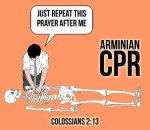Free Will: Does Salvation Depend on a Person's Choice?
At the time of the Protestant Reformation, Martin Luther wrote a book entitled, The Bondage of the Will. This book was written against a man named Erasmus and his teaching that man has free-will, that is, the ability to choose whether or not he would be saved. Luther told Erasmus that this question about free-will was the most important issue of the Reformation. He said, "You [i.e., Erasmus] have not worried me with extraneous issues about the papacy, purgatory, indulgences, and such like, trifles rather than issues ... you, and you alone, have seen the hinge on which all turns, and have aimed for the vital spot."
In spite of what Luther wrote, the teaching of Erasmus concerning free-will has become the teaching of most of Protestantism today. Free-will is:
(1) A denial of predestination. Predestination means that God's will (God's choice) determines all things, including who will be saved (Ephesians 1:3-6). Free-will teaches that man's choice is the decisive thing in salvation.
(2) A denial of the biblical truth that saving faith is a gift of God (Ephesians 2:8-10). Free-will teaches that faith is a person's own decision to trust in Christ.
(3) A denial of the truth that Christ died only for His people (Matthew 1:21). Free-will teaches that Christ died for all without exception and that their salvation now depends on their accepting Him, that is, on their "free-will" choice.
Belief in free-will also shows itself in the kind of preaching and evangelism that is most popular today, the kind that begs sinners to accept Christ, that uses altar calls, appeals, decision times, raising of hands, and other such tactics to persuade them to do so. All these things presuppose that a person's salvation depends on his own choice.
We believe that man's will is in bondage to sin and that he not only cannot do good, but he cannot even want (will) to do it (Romans 8:7-8). Especially he cannot do the greatest good of all, of choosing God and Christ.
We believe, therefore, that man cannot believe in Christ unless it is "given him from above" (John 6:44).
We also believe that not man's will, but God's sovereign and eternal will (predestination) is the decisive thing in salvation (Acts 13:48; Philippians 2:13).
What, then, is the point of preaching the gospel to all? It is "the power of God unto salvation" (Romans 1:16), the way in which God gives faith and repentance to all those whom He has chosen from eternity and redeemed in Christ. May it be that power unto salvation for many!
The Reformation Resurgence
At the time of the Protestant Reformation, Martin Luther wrote a book entitled, The Bondage of the Will. This book was written against a man named Erasmus and his teaching that man has free-will, that is, the ability to choose whether or not he would be saved. Luther told Erasmus that this question about free-will was the most important issue of the Reformation. He said, "You [i.e., Erasmus] have not worried me with extraneous issues about the papacy, purgatory, indulgences, and such like, trifles rather than issues ... you, and you alone, have seen the hinge on which all turns, and have aimed for the vital spot."
In spite of what Luther wrote, the teaching of Erasmus concerning free-will has become the teaching of most of Protestantism today. Free-will is:
(1) A denial of predestination. Predestination means that God's will (God's choice) determines all things, including who will be saved (Ephesians 1:3-6). Free-will teaches that man's choice is the decisive thing in salvation.
(2) A denial of the biblical truth that saving faith is a gift of God (Ephesians 2:8-10). Free-will teaches that faith is a person's own decision to trust in Christ.
(3) A denial of the truth that Christ died only for His people (Matthew 1:21). Free-will teaches that Christ died for all without exception and that their salvation now depends on their accepting Him, that is, on their "free-will" choice.
Belief in free-will also shows itself in the kind of preaching and evangelism that is most popular today, the kind that begs sinners to accept Christ, that uses altar calls, appeals, decision times, raising of hands, and other such tactics to persuade them to do so. All these things presuppose that a person's salvation depends on his own choice.
We believe that man's will is in bondage to sin and that he not only cannot do good, but he cannot even want (will) to do it (Romans 8:7-8). Especially he cannot do the greatest good of all, of choosing God and Christ.
We believe, therefore, that man cannot believe in Christ unless it is "given him from above" (John 6:44).
We also believe that not man's will, but God's sovereign and eternal will (predestination) is the decisive thing in salvation (Acts 13:48; Philippians 2:13).
What, then, is the point of preaching the gospel to all? It is "the power of God unto salvation" (Romans 1:16), the way in which God gives faith and repentance to all those whom He has chosen from eternity and redeemed in Christ. May it be that power unto salvation for many!
The Reformation Resurgence

-
1
- Show all


